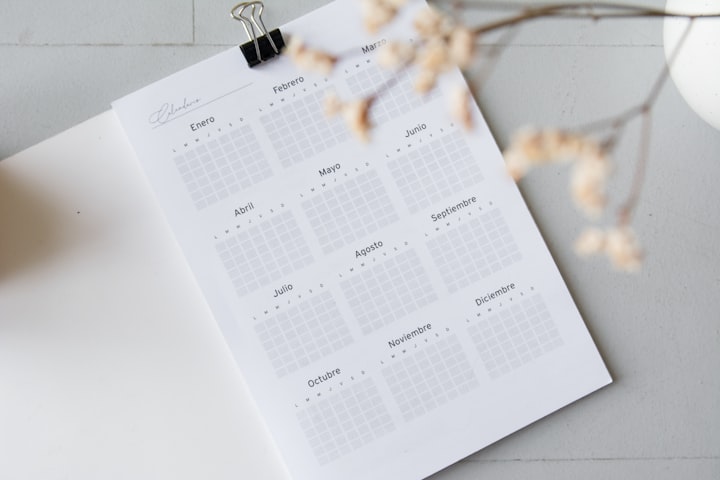
Most people who go to college quickly learn that there is a lot that a student must manage in their day-to-day life. This includes attending classes, labs, seminars, completing coursework and group work, and studying for exams. When you compound this with living on your own for the first time, and working while you are in school, it’s no wonder many students often fill overwhelmed and stressed. It can be hard to manage it all and be successful.
As a recent college graduate, I would like to take the time to share some tips and tricks for organizing your time, so that you can have a successful college experience. I have found that the time management and organizational skills I gained during this period of my life have been a huge asset for after college as well, particularly as I entered the work force. Even if you aren’t in college, I would suggest reading what I have to say, as these tricks can be universal.
Tip #1: Keep track
From my experience, I have found writing down everything that I need to do, to be an effective strategy for managing tasks. Since the first day of college, my tool of choice has been a physical day planner, but for others it may be a digital format, such as an app or digital calendar. I would start with writing out which days I had major deadlines, such as for exams or projects. I would then break these down into major milestones. As an example, for a given exam, I would write myself a note two weeks before as a reminder to start studying and developing my study plan. Two weeks before each exam, I would reference the syllabus and make a plan for which topics I would study on which days. My goal was always to finish studying the material fully, at least one day before the exam. That left an extra day to review concepts that confused me, or to ask questions.
Other things that I would include in my planner are appointments, holidays, events, volunteering, and work. I found it helped simplify my life to have everything in one place. It saved me time when someone asked me to do something, to quickly consult my day planner to check when my next exam was, rather than going to the course syllabus and searching for the exam. Also, seeing everything written out gave me an understanding of how much free time I had to take on anything additional.
Tip #2: Understand what you can realistically accomplish in one day
It is important to understand that even with the best time management skills, it is impossible to accomplish absolutely everything you want to do in life in one day. So, for example, if you have an exam coming up next week, no matter how organized you are or how effectively you manage your time, the odds are that you won’t able to successfully study for your exam, manage your other courses, work full time, organize a volunteer event, train six hours a day for a marathon, and write a novel, all in that one week. However, you might be able to study for the exam, manage your other courses, work and volunteer a few hours a week, run three miles a day, and write a few paragraphs in your novel.
This last example is a bit of an exaggeration, but the point is we all have personal goals we hope to achieve in our lives, even college students, and one of the best ways to achieve goals is to set timelines and micro goals to hold ourselves accountable. Many people even find aggressive timelines to be motivating, as it is a challenge. However, it is important to be weary of overcommitting. Overcommitting can be discouraging, and can lead to exhaustion. This is why it is critical to always be considering what you have on your plate before taking on more. It’s up to the individual to learn what they can handle, and then organize their time to accomplish it. More on this in the next section.
Tip #3: Prioritize!
In the last section, we talked about understanding what you can realistically accomplish in one day. But once you know that, how do you go about deciding on which of the many items on your plate you are going to focus? This is where prioritization is key.
Many students often find themselves in situations where they feel overloaded, especially during midterm exam season. During this time, students have exams for which they need to study, but also a myriad of homework assignments, projects, and presentations to complete. But commitments don’t just stop at school work. Jobs, volunteering, and extra-curricular activities can also be competing for time.
In my experience, I found it helpful to plan how much time I would need to do certain tasks, using my day planner (see Tip #1). For example, over the next two weeks, I may require two hours a day to study, three hours a day for homework, four hours a week for work, and have plans with my friends three nights. I would then consider what tasks I truly need to do, versus those I would like to do. Certain things, like social activities, can be rescheduled, but it is not likely that my exam can be rescheduled.
Next, I have found it helpful to look at what can be renegotiated. Sometimes professors will move the due date of an assignment, project, or report if they know that it is expected to be a particularly busy week for their students. This something that depends on the course, and the professor, and may not always be the case, but is an option that could be discussed if needed.
After this, I would consider the importance of certain tasks. In most of my college courses, exams typically had a heavier weighting than assignments, so having only a finite amount of time, I found it beneficial for me to spend more time studying than working on the assignments. It’s important to note, that this would sometimes mean accepting a lower grade on the assignment then I know I would have received, if I spent more time working on it, but knowing that it is the exam grade that will be heavily weighted for my final course score.
Tip #4: Communication is important
I also worked during college, not full time, but several hours a week. It was during midterm season that I learned the value of timely communication. I would let my supervisor know well in advance when my exams were and that I would not be able to come in as frequently during this time. Fortunately, my supervisor had worked with college students in the past, and didn’t have any issues with this.
I recognize that everyone may not be as fortunate in situations such as these, but the best advice I can offer is to communicate early and communicate often to make your supervisor or co-workers aware of other commitments you may have.
The same holds true for group projects. Many courses have a group project portion, that requires students to work with others in the course to deliver a final project at the end of term. I have seen some of these projects have high weightings in terms of the final course grade. I found in the interest of using my time efficiently, it was critical that the group was in regular communication. For example, if I was researching a specific topic or writing a certain section of the report, and then found out someone else in the group had also done the exact same thing, it would be waste of both of our time. The time spent doing that work could have been spent doing other things. We would also need to sort out whose work we would use in the final report. However, having discussions with the group on a regular basis mitigated this issue. Group members could commit to certain tasks to avoid duplication, and update the rest of the team on their progress.
Tip #5: Blend “thinking” tasks with “non-thinking” tasks
Sitting in lectures, followed by homework, followed by studying can make your brain work in overdrive. After being in a critical thinking state for extended periods of time, it is possible for the brain to be so overloaded that you need to just give up studying for a few hours, or risk wasting time staring blankly at your laptop screen, as you try to remember what you are going to research next.
For me, I found this to be to be a good time to cross other items off my to-do list. I call these “non-thinking” items. These are things that I know are important and that I must get done, but that I don’t need to be in a critical thinking state to accomplish. These include household tasks, such as cooking, cleaning, and laundry. In fact, one of my favourite study breaks was to throw on some music or a podcast, and vacuum my apartment.
Exercise is another beneficial activity that generally does not require you to be thinking critically. There are also many options for exercise, so you can figure out what the best fit would be for you. There are gyms, exercise classes, intramural sports, going for walks, and even exercising at home. For me, I personally didn’t like going to the gym. I just didn’t feel like I could commit the time to commute there, sign-in, change, exercise, and commute back, so I found ways to exercise at home. I bought a yoga matt and some free weights, and would do yoga or pilates just in my apartment.
I was able to focus better after taking one of these “non-thinking” breaks, and would return to studying with renewed productivity. If I used this break time to scroll through my phone, I would feel more sluggish and tired when it became time to start studying again. A clean apartment would also help me feel more productive when studying, so using study breaks as a time to complete housework was, for me, an effective way of managing my time to keep my apartment clean and stay on top of my studies.
Tip #6: Downtime management is equally important
Tip #1 - Tip #5 walked you through time management strategies that I have honed through my college experience. What I want to stress in this final tip is the importance of including downtime in your daily routine. What this downtime looks like is up to you, and will likely vary depending on your day. Some days you may have time to curl up for the whole afternoon and read a book, but other days you may only have a quick 15 minutes before bed to have a bubble bath.
When we are busy it easy to be so focused on managing our time to get everything done, that we can forget that it is important to cultivate time in your day for you to relax. To some, this may seem counterintuitive. Why in an article about organizing my time as a student, are you talking about downtime?
Well, first of all, downtime allows you to rest and rejuvenate. This is critical for brain function, and overall health. If I compared college to running a marathon, you would understand that you can’t sprint the entire thing. Having some slower days, and unorganized time to unwind each day is important to avoid becoming overly exhausted. Exhaustion is a detriment to so many facets of your life, including your productivity. You can be a master at organizing your time, but if you are so exhausted that you aren’t functioning at your full capacity, you could make the case that you are actually now wasting your time.
Secondly, making that commitment to have some time for yourself is a way to start learning about the value of boundaries. Setting clear boundaries with yourself is a good lifelong habit to have, and college is a great place to start. It is really about finding the right balance for you between productive time to accomplish tasks and downtime to recharge.
Thank you for taking the time to read my time management tips for college students. Throughout college, I found that effectively organizing my time, allowed for me to accomplish many of my goals, and helped expose to me to many opportunities. I hope that you can take away something helpful from some, or all, of these tips! If you enjoyed this article, please like it and share it with your friends!
About the Creator
Joyce Kay
Practicing creativity
Instagram: @joycekaywriting
Referral Link: https://vocal.media/vocal-plus?via=joyce






Comments
There are no comments for this story
Be the first to respond and start the conversation.